

Science and Technology - Second Report. Beyond participation: the association betwee... [J Youth Adolesc. 2012] Paoli and Donati Report. On January 22, 2013, representatives from nearly 20 organizations gathered in Lausanne to attend a presentation on the report ‘The Supply of Doping Products and the Potential of Criminal Law Enforcement in Anti-Doping: An Examination of Italy’s Experience', and a related workshop on cooperation between law enforcement and anti-doping organizations hosted by WADA.
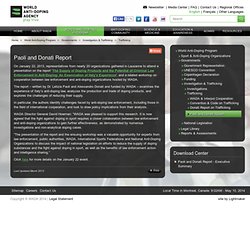
The report – written by Dr. Letizia Paoli and Alessandro Donati and funded by WADA – examines the experience of Italy’s anti-doping law, analyzes the production and trade of doping products, and explores the challenges of reducing their supply. In particular, the authors identify challenges faced by anti-doping law enforcement, including those in the field of international cooperation, and look to draw policy implications from their analysis. WADA Director General David Howman: “WADA was pleased to support this research. Click here for more details on the January 22 event. Www.wada-ama.org/Documents/News_Center/Speeches_Presentations/2011/WADA_DHowman_PCC_Current_Challenges_and_Issues_for_Anti-Doping_2011_12_01.pdf.
Science and Technology - Second Report. Doping must be criminal offence to finally eradicate it. Roar Rookie The Lance Armstrong doping scandal continues to rock the world of cycling.
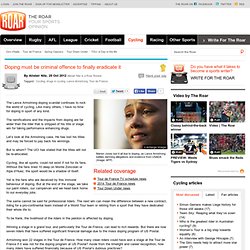
Like many others, I have no time for doping in sport of any kind. The ramifications and the impacts from doping are far wider than the rider that is stripped of his title or stage win for taking performance enhancing drugs. Let’s look at the Armstrong case. He has lost his titles and may be forced to pay back his winnings. But to whom? Cycling, like all sports, could not exist if not for its fans. Yet is the fans who are deceived by this immoral behaviour of doping.
Www.wada-ama.org/Documents/News_Center/News/2013-Paoli-Donati-Report-Executive-Summary-EN.pdf. Will an athlete who is caught using performance enhancing substances be guilty of a criminal offence? The use of performance enhancing substances in sport is currently a huge issue as there seems to be no potential of it decreasing.
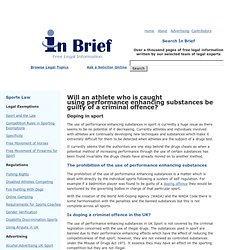
Currently athletes and individuals involved with athletes are continually developing new techniques and substances which make it extremely difficult for them to be detected when athletes are the subject of a drugs test. It currently seems that the authorities are one step behind the drugs cheats as when a potential method of increasing performance through the use of certain substances has been found invariably the drugs cheats have already moved on to another method. The prohibition of the use of performance enhancing substances The prohibition of the use of performance enhancing substances is a matter which is dealt with directly by the individual sports following a system of self regulation.
For example if a badminton player was found to be guilty of a doping offence they would be sanctioned by the governing bodies in charge of that particular sport. Make doping a crime, says Lewis. Lewis says it is time for governments to get tough with drugs cheats Olympic legend Carl Lewis has called on governments around the world to make the use of banned substances in sport a criminal offence.
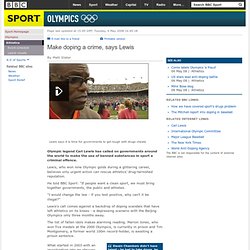
Lewis, who won nine Olympic golds during a glittering career, believes only urgent action can rescue athletics' drug-tarnished reputation. He told BBC Sport: "If people want a clean sport, we must bring together governments, the public and athletes. Where in the world is doping a crime? (doping in sports pt. 6) In the previous FlagPost in this series we examined actions related to doping in sport that can also be prosecuted as crimes in Australia.

Do other countries criminalise doping in sport, or is Australia unique in having criminal offences that apply to conduct associated with Anti-Doping Rule Violations (ADRVs)? In Australia some actions related to doping in sports (e.g. trafficking, possession, use or administration of steroids) are also crimes under various Commonwealth, state or territory statutes. However, none of those laws are sports-specific but rather reflect a mixture of criminal, therapeutic goods or customs legislation that happen to cover conduct related to some ADRVs. Www.wada-ama.org/Documents/Education_Awareness/SocialScienceResearch/Researchers_Directory/HEOC - performance enhancing drugs and risk decision making.pdf. Www.wada-ama.org/Documents/World_Anti-Doping_Program/WADP-Legal_Library/National_Legislation/UK_Anti_Doping_Legislation_Sept_2010.pdf. Drugs in sport: Wada says doping and organised crime 'too big to manage'
Levels of doping in sport are now worse than ever, and a new trans-national body is needed to combat wide-ranging corruption, according to the World Anti-Doping Agency.
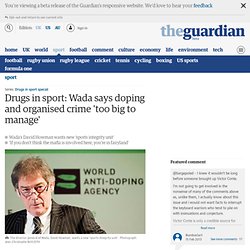
It also fears that athletics will follow cycling in uncovering a serious culture of cheating. In the wake of the Lance Armstrong case, the revelations emerging from the Operation Puerto trial in Spain and the dire picture painted by the Australian Crime Commission investigation into organised crime and drugs, the Wada director general David Howman has admitted the problem is getting "bigger and more serious" and is "getting too big for sport to manage". He has issued a plea for a new "sports integrity unit", with Wada as part of it, that would take responsibility for combating doping, match-fixing, corrupt betting and other forms of cheating increasingly linked to global organised crime and liaise with law enforcement agencies around the world.
"Where's the commitment here?